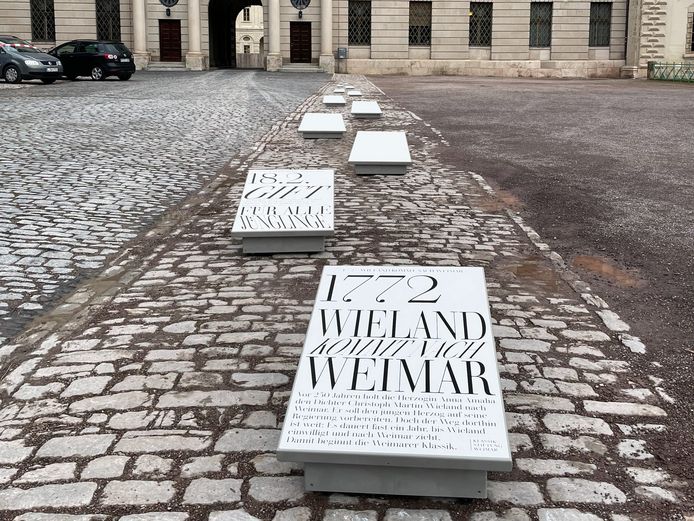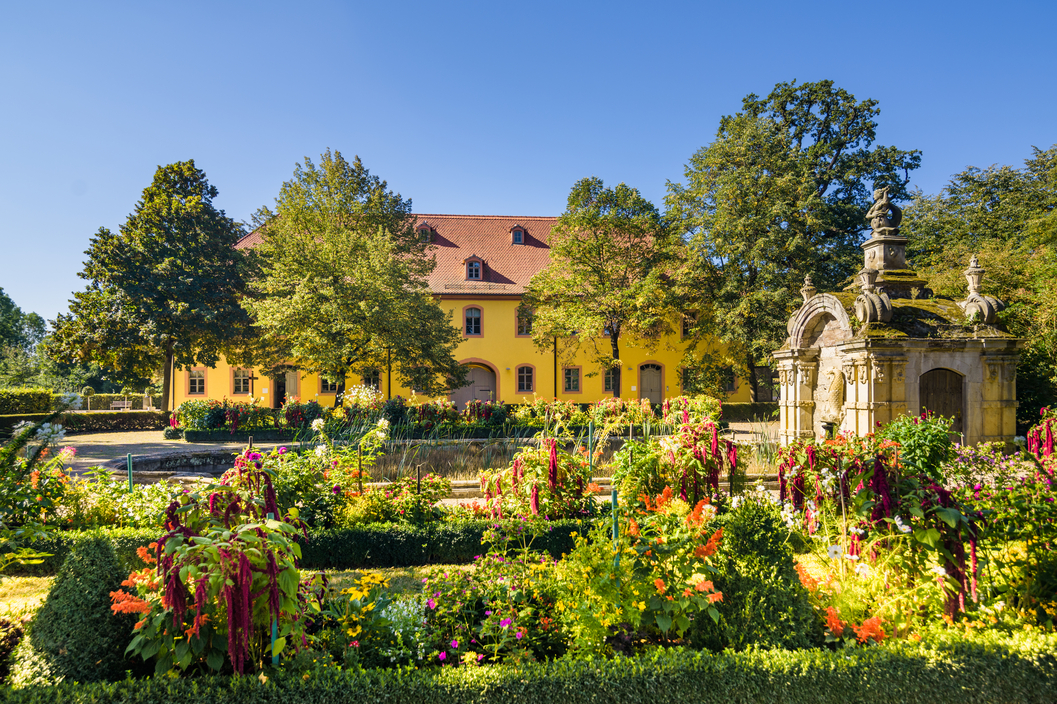Projects of the Klassik Stiftung Weimar are funded by the European Regional Development Fund (ERDF) and the Free State of Thuringia, represented by the State Chancellery of Thuringia, Department of Culture and the Arts.
Wieland Commemoration
It was 250 years ago that Christoph Martin Wieland arrived in Weimar. In 2022, we commemorate the poet and revolutionary thinker with a colourful programme featuring an art installation, exhibitions and events.
When Duchess Anna Amalia was looking for an scholarly mentor and conversation partner for her adolescent son Carl August, she chose the most popular writer in Germany at the time: Christoph Martin Wieland (1733–1813). He was a poet, translator, journalist, professor, princely tutor, talent promoter and European who was widely regarded as one of the most influential philosophers of the Enlightenment.
Wieland moved to Weimar exactly 250 years ago. Here, he started the journal “Der Teutsche Merkur” and placed Weimar on the German cultural map years before Goethe’s arrival. As part of the upcoming Theme Year programme on “Language”, the Klassik Stiftung Weimar commemorates Christoph Martin Wieland with a series of exhibitions, events and presentations.
Insight into the Audiowalk „Discover the language events in Weimar”: Wieland memorial
Installation in front of the Weimar City Castle

The installation in front of the City Castle presents Wieland’s path to Weimar in 1772. Beginning in February, a new paving stone will be laid each month until his entire path to Weimar is complete with Wieland’s prediction of Weimar’s future. The installation by Ariane Spanier features historical quotes and lines from his correspondence. With the addition of each stone, more information will be provided in a monthly newspaper column in the Thuringer Landeszeitung, detailing specific aspects of Wieland’s life and work.
- 1772Wieland comes to Weimar
Two and a half centuries ago, Duchess Anna Amalia invited the poet Christoph Martin Wieland to come to Weimar and to help prepare the young Duke for his reign. But it would be a while before Wieland took up his duties: almost a year passed before he accepted and moved to Weimar. That event marks the beginning of the period known as Weimar Classicism.
- 18.2.Poison for all young men
"... Various fools here publicly forbid their listeners to read Wieland, calling his writings the most noxious poison to all young people: ‘They ought to be burnt!’ they cry … " Wilhelm Heinse to Johann Wilhelm Ludwig Gleim
- 22.3Conduct oneself properly
“With the princes, everything depends on this: they must make a habit of never forgetting that they are human, and therefore see their equals wherever they look. His Highness the Prince will see that a ruler’s true glory consists in being able to rule himself well, and ruling his country well, fulfilling all his duties, making his people as happy as possible.” Wieland to Duchess Anna Amalia
- 17.4.Wieland, the favourite
"Without a doubt you already know that Wieland is the darling of the Duchess of Weimar, and that she has given a ball for him at which all the characters and scenes of the ‘New Amadis’ were played. O that our little crocodile despots in the German Empire might follow her example!” Wilhelm Heinse to Johann Wilhelm Ludwig Gleim
- 5.5.I adore your princes
“I like it very well at your court, it is true. I love your princes. But if I were no longer free to go away again, I would see the court that so enchants me in my present situation with different eyes altogether." Wieland to Count Görtz
- 21.6.Feed for two horses
"The conditions you mention, my dear Count, are without doubt quite acceptable. A pension of 1000 ecus for life and regardless of all eventualities; another of 300 ecus for my wife or my children in the event of my death; and finally, complete freedom as soon as the Prince shall have attained the age at which he can govern his country autonomously. Yet I would add one small item, and that is feed for two horses, as I am very fond of going out for a drive, and this way of getting about is very agreeable to my constitution.” Wieland to Count Görtz
- 24.7.To make people happy
“I am very glad if my mother’s invitation to come here as our philosopher has pleased you. It is my sincere desire to lighten the burden of our lessons as much as possible. I will endeavor, with the aid of my good and dear mentor, to put into practice all the good hopes which you have for me—namely to make my country & people happy, as may be expected of a virtuous lord.” Hereditary Prince Carl August to Wieland
- 7.8.Intellect and heart
“I am entering the service of the court at Weimar as councillor and tutor to the crown prince. When I received the invitation to help cultivate the mind and the heart of a young prince who is to rule in a few years, I could not do otherwise than to think this is an occasion to do more good than I have been able to do my whole life up to now. The air of the court will not, I hope, prove contagious.” Wieland to Sophie von La Roche
- 17.9.Revisions of incorrect judgements
“I am resolved to undertake a kind of journal which, as to its form, will have some similarities with the Mercure de France. Its main articles will consist of original prose, literary notices, reviews and revisions of incorrect judgements on interesting writings. I will have a regular staff, and will be very happy if I am sent something good from time to time, even from utter dilettantes. Its title, to call the thing what it is, shall be Der Teutsche Merkur.” Wieland to Friedrich Justus Riedel
- 28.10.Comedy in the evening
“Report of the Principal Birthday Celebrations.
On Saturday last, the 24th of the current month, the Regency’s dominions Saxe-Weimar, Eisenach and Jena had the quite uncommon pleasure of observing the high birthday celebration of Her Serene Highness their Princess, Lady Anna Amalia, dowager Duchess of Saxony, Guardian and Regent of the State, our most gracious Princess and Lady.
In the evening a Comedy was given, and afterwards the Singspiel Aurora was performed, to general applause, which had been written expressly for Her Highness’s birthday by the honorable Councillor Wieland; the excellent music whereof had been composed by Her Highness’s Concert Master Schweitzer.” Weimarische Wöchentliche Anzeigen (Weimar Weekly Gazette)
- 23.11.Rapture of enthusiasm
“You know of the change in my circumstances. My latest news is that I will soon present a Singspiel in 5 acts (but very short ones), called Alceste. Mr Schweitzer is the man who has bewitched me into this frenzy of enthusiasm for lyric theatre.” Wieland to Johann Georg Jacobi
- 4.12.From the ends of the earth
“I have had the pleasure of being confirmed in the hopes I have of our young prince. If Heaven grant him and a few good friends of his life, you shall see in six years’ time a little court that will be worth coming from the ends of the Earth to see.” Wieland to Friedrich Heinrich Jacobi
Reopening of the Wieland Estate in Ossmannstedt
A new exhibition concept in the historic living quarters of the Wieland Estate portrays Christoph Martin Wieland as a novelist, chronicler of the French Revolution and translator. Additional exhibition space in the historic residence, the interplay with the romantic park and the Wieland gravesite on the Ilm River, and other detailed information and media are sure to make Ossmannstedt an exciting new experience for all friends of Weimar Classicism.


